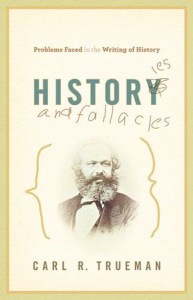Book Review

December 17, 2010

My Review of Carl Trueman's Histories and Fallacies has now been posted at TGC Reviews.
Histories and Fallacies is a different kind of book for Carl Trueman. He is accustomed to writing history, not about how history ought to be written. In a rather candid moment Trueman admits that his view of the historical task formerly mirrored Shaw’s attitude toward teachers: “those who can write history, do write history; those who cannot, write books telling others how to do it” (p. 13). Thankfully, however, Trueman has come to believe that there is indeed a place for the historian to weigh in on those questions that underlie the task of writing history.Read the entire review HERE.
Not only is Histories and Fallacies a different kind of book for Trueman, it is a different kind of book for Crossway. That is, it is not an explicitly “Christian” book as we tend to measure such things in our present moment. I commend Crossway for publishing such a work. For while this present volume does not deal with explicitly Christian themes in the sense that a book on the doctrine of Christ does, Histories and Fallacies is nevertheless an important book for Christians whose hope is wrapped up in thousands of years of history. After all, we say that our salvation depends upon a series of objective events in the past. Christians, therefore, ought to be competent historians.
Trueman readily admits that there are unavoidably subjective realities in the interpreting and writing of history. “History,” he writes, “is not simply a collation of facts which can only be related together in one valid narrative” (p. 17). However, as we consider the past we must “rule out of bounds the possibility that there are a potentially infinite number of sometimes contradictory yet equally valid ways of talking about the past” (p. 17). Using the rather amusing example of theories suggesting that Elvis is “still alive and well and working as a shelf-stacker in a supermarket,” Trueman warns against “a kind of epistemological nihilism that has so relativized everything that access to the past in any meaningful way is virtually denied” (p. 18). This, I suggest is the heart of Histories and Fallacies. It is also the reason why this volume is important. Many of us who labor as pastors are often confronted with the fruit of historical deconstructionism and “epistemological nihilism,” which has become rather chic in certain evangelical circles.




